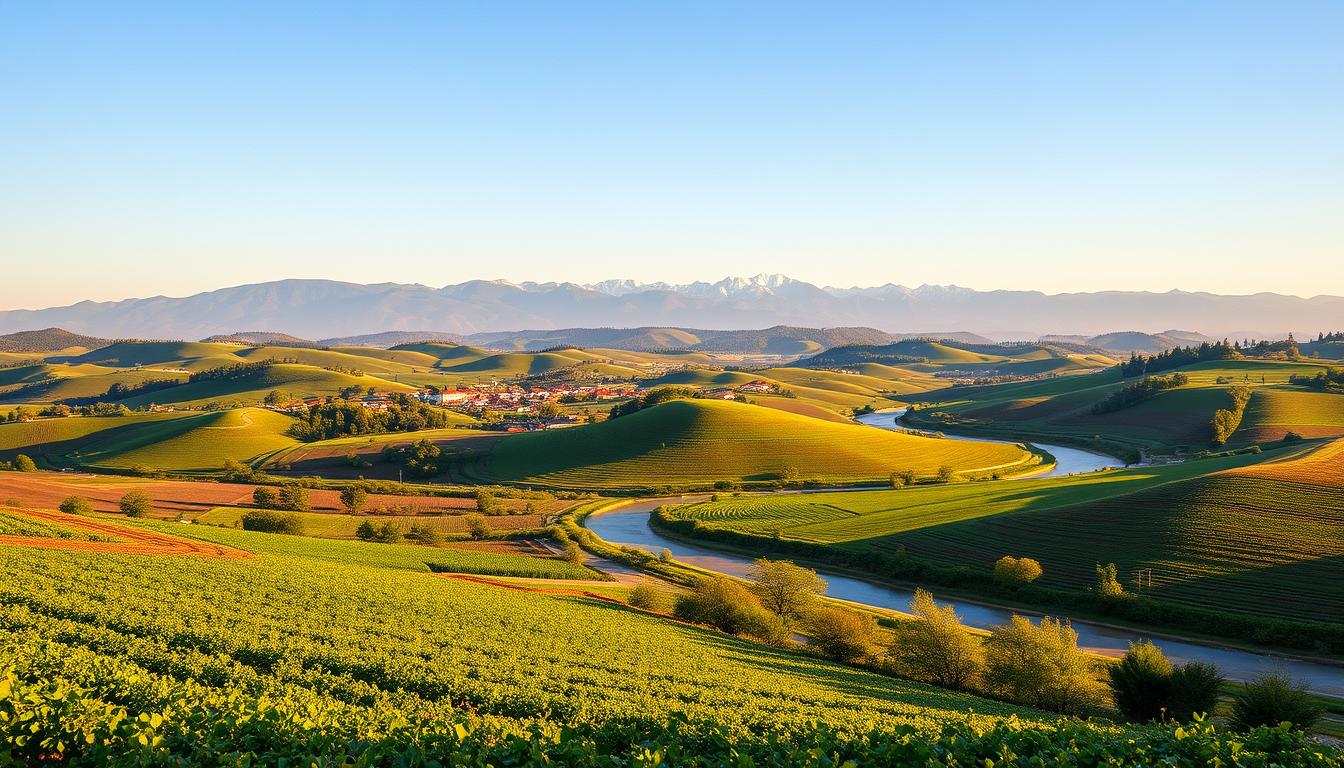We explore Bulgarian agriculture, looking at its long history. The farming practices in Bulgaria have changed over time. The country’s varied climate and fertile land shape what crops are grown and how they are farmed.
Bulgaria’s deep roots in farming make it a key player in the EU’s agriculture. We will see how important this sector is to our economy. We will also look at the challenges and progress in our agricultural industry.
Overview of Bulgarian Agriculture
Bulgarian agriculture is diverse and rich. Looking into its history helps us see how old ways have changed into new farming methods. It has always been key to Bulgarian society, changing with history, economy, and society.
Historical Background
Agriculture has been vital in Bulgaria for ages. Early farmers grew staple crops, then added grains, fruits, and veggies. Communism changed farming, leading to big farms and shared land. After communism fell, land was given back to farmers, starting a new era.
Current Trends
Today, Bulgarian farming is moving towards being green and varied. Organic farming is becoming popular, meeting demand for healthy food. New tech, like precision farming, is helping farmers work smarter. These changes show Bulgarian farming is modern and true to its roots.
Economic Importance
Agriculture is big for Bulgaria’s economy. It helps the country’s GDP and gives jobs in rural areas. Over 10% of the workforce depends on it, showing its value. It also helps local economies grow and keeps food prices down.
| Year | Major Development | Impact on Agriculture |
|---|---|---|
| 1944 | Communist takeover | Shift to collective farming |
| 1990 | Fall of communism | Return to private ownership |
| 2007 | EU Membership | Access to subsidies and new markets |
| 2020 | Rise of organic farming | Increased focus on sustainability |
Major Agricultural Products in Bulgaria
We will look at the main agricultural products in Bulgaria. These products are key to our economy and food culture. We’ll cover cereals and grains, fruits and vegetables, and livestock farming. Each area shows the rich farming scene in our country.
Cereals and Grains
Bulgaria is known for its cereals, like wheat and corn. We produce millions of tonnes of wheat every year. This makes us a top grain producer in the European Union.
The good weather and fertile land help grow many high-yield crops. Corn is also important, used for food and animal feed.
Fruits and Vegetables
Bulgaria’s fruits and vegetables are diverse and thrive in our different climates. We export a lot of tomatoes, peppers, and berries. Some areas, like Plovdiv and Yambol, are famous for their tomatoes.
Bulgarian peppers are also known for their unique taste. They add to our fresh produce and help make Bulgaria famous for its food.
Livestock
Livestock farming is important in Bulgaria. We mainly raise sheep and cattle. These animals are part of our local food and our rich culinary traditions.
Sheep farming is big, with products like feta cheese being loved worldwide. The cattle industry supports dairy and meat, showing Bulgaria’s food and culture.
Role of Technology in Agriculture
Technology is changing farming in Bulgaria in big ways. Precision farming has made managing land and growing crops much better. It uses advanced tools to make farming more efficient and increase crop yields. This helps us meet the growing need for food in a way that’s good for the planet.
Precision Farming
Precision farming is leading the way in Bulgarian agriculture. It uses GPS, drones, and satellite images to track and care for crops. These tools help us understand soil, moisture, and crop health better.
With this data, we can plan and act on how to grow more with less. It’s a win-win for farmers and the environment.
Sustainable Practices
We’re also focusing on sustainable farming. This means using water wisely, rotating crops, and managing pests in a smart way. These methods protect our land and meet the need for greener farming.
Government Policies Affecting Agriculture
We look at how government policies shape agriculture in Bulgaria. We focus on two main areas. First, EU membership’s impact on funding and subsidies is huge. It gives Bulgarian farmers chances to modernise and grow.
Second, we check out local farming rules in Bulgaria. These rules cover many aspects of farming.
EU Membership Benefits
Bulgarian agriculture gets a big boost from EU membership. EU subsidies help farmers use new farming methods and tech. These subsidies help increase productivity and support green farming.
For example, farmers can get direct payments to help their work. This supports their lives and promotes sustainable farming.
EU funding also goes to rural projects. These projects are key for better infrastructure and helping small farms. EU money helps Bulgarian farming stay strong and meet EU standards.
Local Regulations
Local farming rules in Bulgaria are also key. They cover land use, environmental rules, and safety. These rules help farmers balance productivity and care for the environment.
Complying with these rules is vital for farmers to get EU funding. The Bulgarian government helps farmers meet these standards. They offer financial help for green practices, matching EU goals.
Agricultural Exports from Bulgaria
Bulgaria is a big player in the global market for farm products. We’re known for top-notch items like rose oil, cereals, and fresh fruits and veggies. Looking at recent stats helps us see what’s driving this important sector.
Key Markets
Many countries are big buyers of Bulgarian farm goods. The European Union is our biggest trading partner, taking a big share of our exports. Key markets include:
- Germany
- Italy
- Greece
- Romania
- Sweden
These countries buy a lot of our products, helping our farm exports grow. The demand for special items like rose oil is also boosting our sales.
Export Statistics
Recent numbers show our farm exports are on the rise. Over the last year, they went up by about 15%. This growth is mainly thanks to strong sales of cereals and fresh produce. Here’s a look at the top categories:
| Product Category | Export Value (in million EUR) | Percentage of Total Exports |
|---|---|---|
| Cereals | 350 | 40% |
| Fruits and Vegetables | 250 | 30% |
| Rose Oil | 100 | 12% |
| Dairy Products | 80 | 9% |
| Meat Products | 40 | 5% |
This data shows we can meet global demand. It also shows how Bulgarian farm exports are changing in a competitive world.
Challenges Facing Bulgarian Agriculture
Bulgarian agriculture is facing many challenges. The sector is dealing with big issues like climate change and tough market competition. These problems need urgent solutions.
Climate Change
Climate change is a big threat to farming. Weather patterns are changing, making it hard to predict when crops will grow. This affects how much food we can produce.
Extreme weather like floods and droughts is becoming more common. Farmers must find new ways to grow crops that can handle these changes. It’s vital to understand and tackle climate change to keep farming going.
Market Competition
Farmers in Bulgaria are up against strong competition. Cheap imports from other countries make it hard for local farmers to compete. This can hurt their business and quality of life.
But, there are efforts to help farmers. Improving local farming practices can make Bulgarian products more competitive. Knowing the market competition helps us support local farmers and boost agriculture in Bulgaria.
The Impact of Climate on Agriculture
Climate greatly affects farming in Bulgaria, shaping how we farm and what we grow. It’s key to understand how weather impacts our farming. This helps us see how weather and farming go hand in hand.
Seasonal Variations
Seasonal changes play a big role in how crops grow and how much we harvest. Changes in weather can make planting and harvesting happen sooner or later. For example, warmer springs can mean we plant earlier, but unexpected frosts can harm our crops.
Farmers in Bulgaria have to be quick to adapt to these changes. They do this to get the best from their land and avoid losing crops.
Crop Vulnerability
Climate change makes crops more vulnerable in Bulgaria. Some crops, like cereals and vegetables, are more sensitive to weather changes. Droughts and heavy rain can really hurt their health and how much we can harvest.
To fight these issues, farmers are trying new things. They’re choosing crops that can handle the weather better and using new ways to water their crops.
Organic Farming in Bulgaria
Bulgaria’s farming is changing fast, with a big move towards organic farming. People are more aware of health and environmental issues. This has made farmers switch to organic farming, showing the power of sustainable farming.
Growth of Organic Products
In Bulgaria, organic farming has grown a lot in the last ten years. More organic fruits, vegetables, and grains are being made. People want products without synthetic pesticides and genetically modified organisms.
This has made farmers choose organic farming. It has also made our farming more varied.
Certification Processes
To make sure products are organic, Bulgaria has strict rules. Getting organic certification is key for selling locally and abroad. Farmers must follow rules on soil, crop rotation, and pest control.
Getting certified makes products more trusted. It also helps them reach global markets where organic demand is high.
Agricultural Education and Research
In Bulgaria, education and research in agriculture are key. They help improve farming practices and support future farmers. Institutions work hard to teach new skills and tackle current farming problems.
Institutions and Programs
Many top research places in Bulgaria focus on teaching and studying agriculture. They offer a wide range of courses. These include:
- The Agricultural University of Plovdiv – Known for its innovative research.
- The Institute of Soil Science, Agrochemistry and Plant Protection – Works on sustainable farming.
- The National Agricultural Advisory Service – Helps farmers through education.
These places mix classroom learning with practical skills. This way, students can use what they learn in real farming situations. The research done here often leads to new ways to farm better and more sustainably.
Community Involvement
Community programs in agriculture are very important. They bring farmers and schools together. Some examples are:
- Workshops and training to teach new farming methods.
- Local groups where farmers share knowledge and best practices.
- Programs to get young people interested in farming.
These efforts improve education in Bulgaria and help the local economy. They make farming a good career choice for the future. By working together, we can make farming better for everyone.
Future Perspectives on Agriculture in Bulgaria
Looking ahead, innovation and sustainability are key to solving agriculture’s challenges in Bulgaria. We need to boost productivity while protecting our environment. New farming methods and technologies are emerging, promising better yields and ecological balance.
Another important trend is getting more young people involved in farming. Many programs are starting to attract the youth. These initiatives offer education and practical training, essential for modern farming.
Combining new technology with young people’s energy is vital for Bulgaria’s agriculture. We must support a sector that grows economically and cares for the environment. By engaging the next generation, we ensure a strong and sustainable future for farming.







